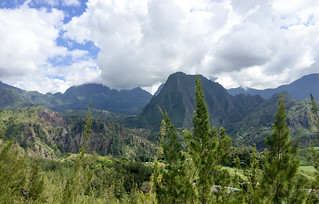Normally, even when I go to fairly obscure places (like, say, Iceland), it’s still pretty obvious, between my reviews and the geocoding, where I went. But this year’s vacation took us to yet another island destination, this one not even a blip on even most adventuresome Americans’ radar. Indeed, when telling people where this year’s vacation destination was, aside from one French coworker, everyone’s immediate response was “Where?”.
This “mystery destination” was the Île de la Réunion, a small (smaller than Rhode Island, although much more rugged), volcanic island, located 550 miles due East of Madagascar in the Indian Ocean. It’s actually an “overseas Department” of France, which gives it a status similar to Hawaii, in that it’s actually considered part of France and not a territory or colony (but, a bit oddly, not part of the Schengen Treaty Area, so a flight from Paris to Réunion was actually “international” with duty-free shopping). If I had to come up with a short and reasonably accurate description, it’s basically the French version of the Maui: beaches, volcanoes, great scenery, coffee (and vanilla, and banana…) plantations. And, for a number of reasons, tourism there, until very recently, was almost exclusively consisting of people from mainland France.
Volcanic in nature, the island was basically unknown and unsettled until the mid-1600s (not having many workable ports or beaches on a rugged, volcanic coastline didn’t help), when the French finally established colonies there as the Island of Bourbon (later renamed after the French revolution when the Bourbons weren’t all that popular…).
Like many tropical islands, it quickly became exploited by the French East India company, primarily for the growing of a well-prized coffee variety, Bourbon Pointu (coffee with little pointed beans… we’ll come back to that later). Much of the arable land of the island was converted to agriculture, primarily growing coffee, with the labor primarily provided by French-imported slaves from Africa, with a smattering of other Indian ocean ethnicities as well. Then, in the late 1700s, a combination of a collapse of the East India company, several bad cyclones (Réunion and Mauritius frequently experience severe cyclones every rainy season), and then the loss of the island to the British in the Napoleonic Wars resulted in the British taking over the island, and replacing the failed coffee plantations wholesale with sugar cane, which to this day is an important cornerstone of the island economy. However, the French regained the island in 1815.
The end of slavery in France in 1848 resulted in a massive labor shortage in the cane fields, and the primary response was a shift to indentured servitude (a practice that lasted until the 1930s). So, like Hawaii, a rather large number of immigrants were brought to the island: primarily from nearby Madagascar (the Malagasy people), but also India (primarily from Pondichery, which to this day is still a heavily-French influenced area of India), China (primarily from Guangzhou, which is likewise still heavily French-influenced), Indonesia, and Portugal. Following the end of World War II (in which the island was nearly completely isolated from the rest of the world and had to massively diversify their agriculture to survive, and build a rum industry for exports), the age of jet transport turned this obscure French colony into a tropical tourism industry. But until 2000 (when direct flights from Paris became common), getting there was still a bit of a challenge, so tourism there is almost completely from France, which makes for some interesting cultural effects, particularly that of being a place that gets almost zero tourism from the Western Hemisphere, and being American is particularly eyebrow-raising (indeed, we were mistaken for South African, German, Australian, and even Brazilian more often than anyone thought we were British or American), and my experience most of the native population had never actually met Americans before.
So the question is, why did we choose Réunion? Quite frankly, it came down to a list of four reasons:
- The scenery. The rugged, volcanic structure of Réunion gives it some of the most incredible scenery I’ve ever seen for such a small island. We were awed several times by the wonderful views.
- The hiking. Réunion has a really strong hiking and trail-running culture, and really encourages visitors to actually hike and visit the remote parts of the island, including maintaining a series of mountain “gîtes”, guest-houses run much like New Hampshire’s AMC Huts, so you can enjoy multi-day trips without having to lug around sleeping bags and food.
- The food. The combination of French, Malagasy, African, Indian, Chinese, Indonesion, and, well, several other influences, combined with an island agricultural economy rich in tropical fruits, spices, herbs, and unique ingredients, makes for a rich culinary tradition with some wonderful flavors and dishes without parallels elsewhere in the world. It truly is a culinary marvel, as you’ll see from my reviews
- From an anglophone perspective, it’s truly the road less traveled. Aside from a few chapters in a Lonely Planet guide mostly dedicated to nearby Mauritius and the Seychelles, very few anglophones travel to Réunion, many because of the language barrier. But I decided that my two years of sloppy high-school French were good enough (they were, with patience)
So we packed our bags, and headed off for two and a half weeks of exploring one of the Indian Ocean’s most interesting tourism destinations. I hope you enjoy my travelogue and reviews.



Incredible place! I didn’t know anything about this beautiful little island. Thanks to you for sharing your “off the beaten path” travel excursions I am getting glimpses of some marvelous places in this world that I will never see for myself. Or even knew existed. Your write ups are interesting to read and very informative…as well as entertaining! Thanks, Rich!